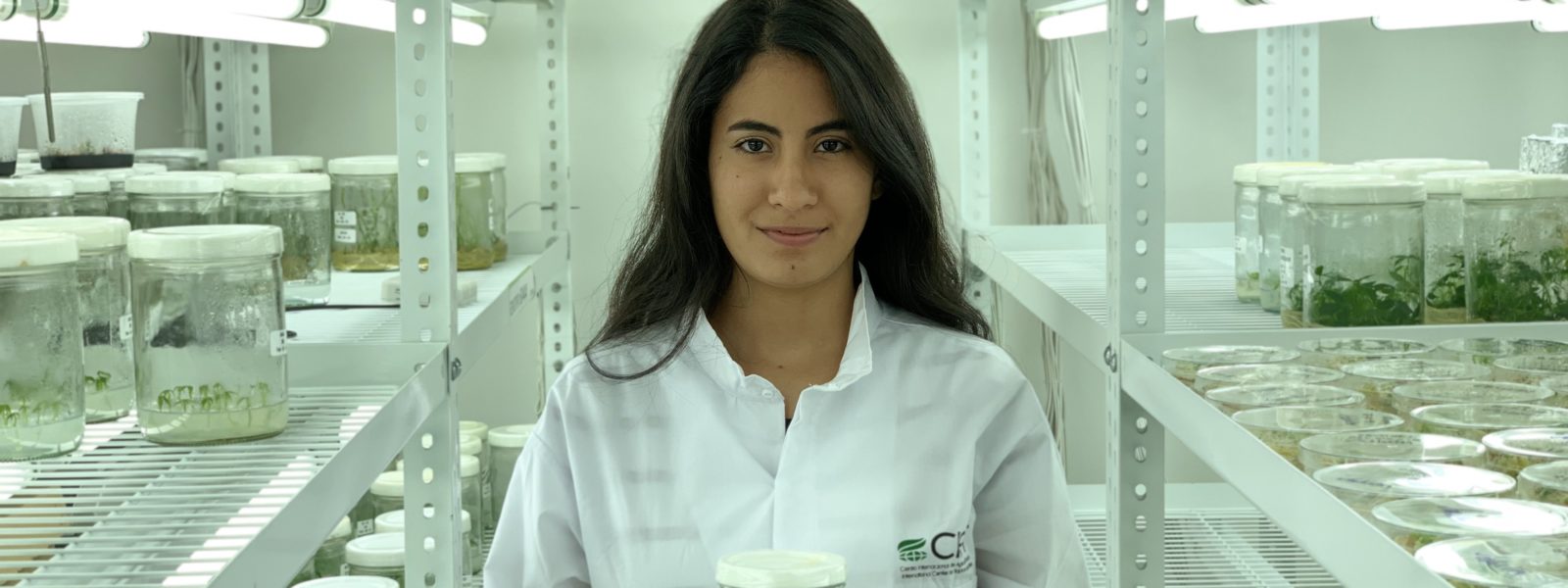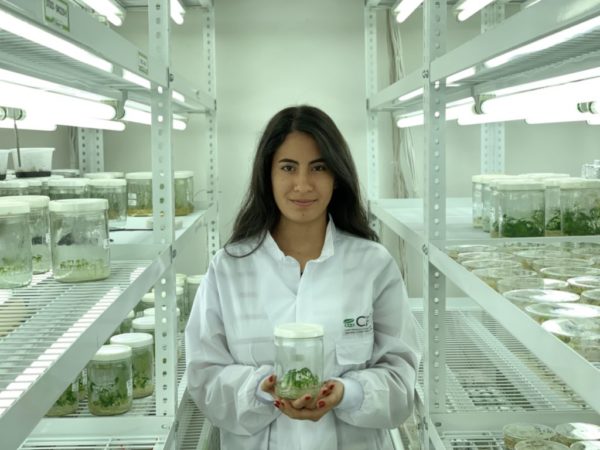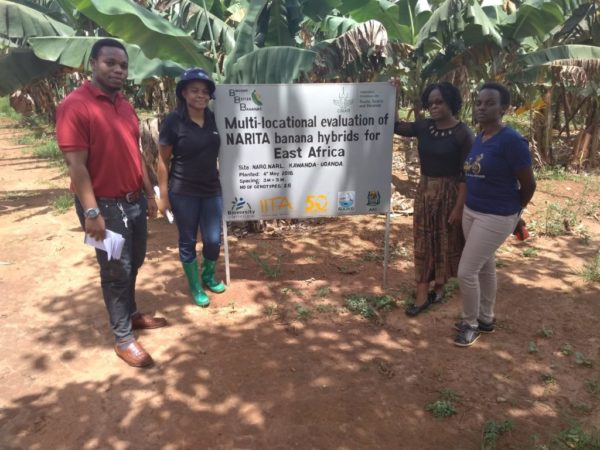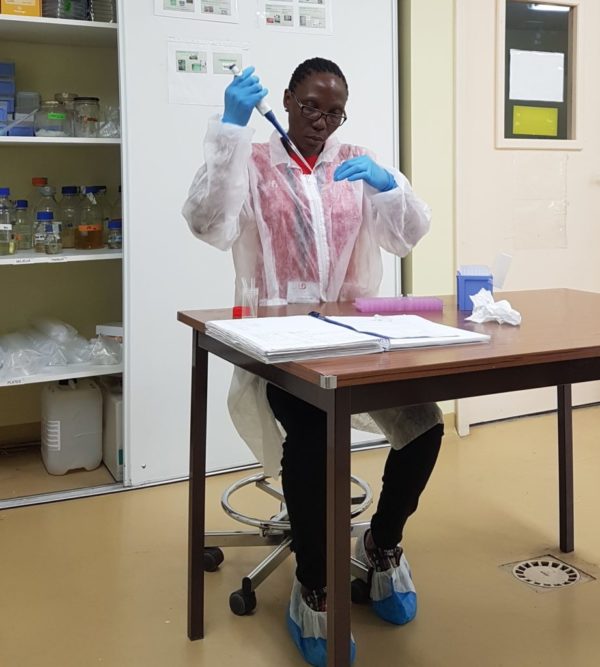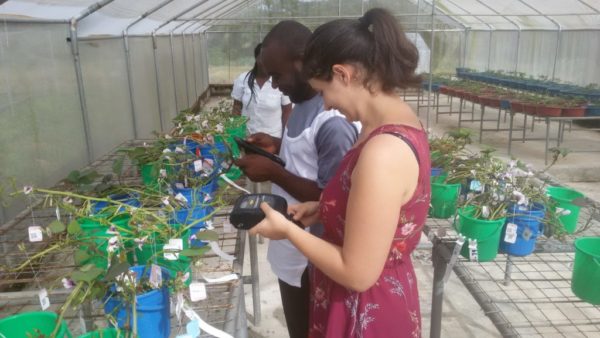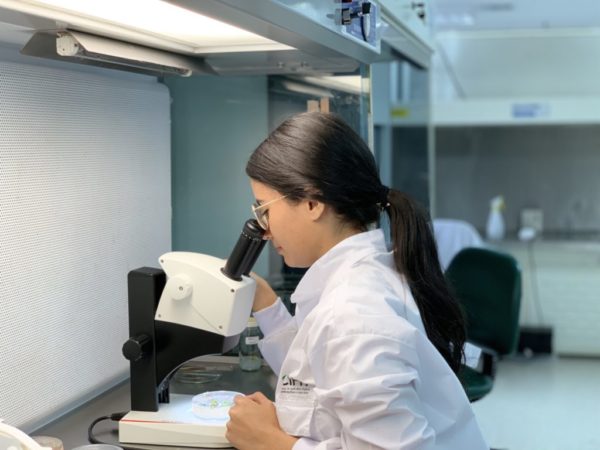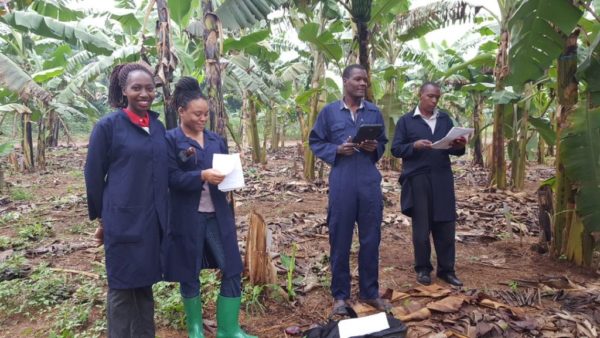Despite progress in recent years, there still remains a concerning gender gap in science, with the UNESCO Institute for Statistics reporting that less than 30% of researchers worldwide are women. A further study by UNESCO has shown that only 30% of female students choose STEM-related fields in higher education, and globally the enrolment of female students in natural science, mathematics and statistics is only 5%.
To achieve the Sustainable Development Goals and improve the incomes and food and nutrition security of root, tuber and banana smallholders, advancement in both science and gender equality is essential.
Our diverse team of scientists working across disciplines and in more than 20 countries are the backbone of the CGIAR Research Program on Roots, Tubers and Bananas (RTB) and we are proud to support equal opportunities for women and men in science.
To mark the International Day of Women and Girls in Science on February 11, we are shining a light on four of our inspiring young women scientists who are working to stop the spread of banana diseases, ensure that new crop varieties benefit women and men equally, develop virus-resistant sweetpotato, improve our understanding of cassava genetics, and much more.
What inspired you to pursue a career in science?
Jolien Swanckaert, Sweetpotato Breeder, International Potato Center (CIP)
A career in plant breeding never gets boring. It is a great way to combine science and field work. And I can contribute to food security in Africa through plant breeding.
Valentine Nakato, Research Associate, International Institute of Tropical Agriculture (IITA)
I desired a career that would keep me interested and passionate and at the same time provide me with new challenges. Globally, plant diseases emerge and re-emerge, impacting on food security, thus requiring new and improved control methods. So, the field keeps me anticipating something and thereby requiring alertness, focus and determination.
Camila Gonzalez Campo, Research Assistant, International Center for Tropical Agriculture (CIAT)
Studying the dynamics of life, from a molecular and cellular level to the level of ecosystem and biosphere, motivated me to pursue a Bachelor of Science in Biology. During my studies, I developed a great interest in plants and the importance of their understanding for the management and maintenance of sustainable ecosystems. This inspired me to focus my career in Plant Genetics and Biotechnology to contribute to global food security and humankind’s well-being.
Pricilla Marimo, Post-Doctoral Fellow, Gender, Bioversity International
Throughout my academic and career life, I have always been drawn to do agricultural research that seeks to understand the gendered aspects and dynamics in farming systems particularly those in an African context. Gender and breeding has aspects which I am interested in exploring such as the risks and benefits associated with introduction of new technologies, like improved crop varieties, and the social consequences of such introductions in the different groups in our societies – women, men, youth, etc.
What does your work focus on?
Jolien
I work as a sweetpotato breeder at CIP, currently based in Uganda. We evaluate genetic material from all over the world. The best adapted germplasm is used to develop populations with a high resistance to sweetpotato virus disease.
Valentine
I am currently engaged in four activities. The first is understanding the genetics of resistance to Xanthomonas campestris pv. musacearum the cause of the devastating Banana Xanthomonas Wilt (BXW) disease, that is ravaging banana production in East Africa. I am also conducting surveillance to map the extent of BXW spread in East Africa. Next, I’m looking at how we can harness microorganisms called endophytes as part of sustainable soil fertility, pest and disease management practices. And lastly, to better understand the effect of a changing climate on diseases we are using altitude bands at watersheds as proxies for climate scenarios and assessing the incidence and severity of banana pests and diseases.
Camila
Currently, I’m working at CIAT for the cassava breeding program. I’m working in the cassava genetics lab were I’m developing a cytogenetic study of Latin American cassava subpopulations. The aim of this project is to establish the chromosome number and size of wild and cultivated cassava varieties maintained at CIAT’s germplasm bank.
Pricilla
I am currently evaluating acceptability of new high yielding banana hybrids that are disease and pest resistant, and socio-economic issues related to introduction and adoption of new crop varieties by male and female value chain actors. I am closely working with banana breeders and other social scientists to better understand end users’ needs and preferences that will inform current and future banana breeding efforts.
How is your work supporting equitable benefits for both women and men?
Jolien
Women and men working along the food chain have different interests. We try to capture all aspects in our breeding program. Our focus on orange fleshed sweetpotato has improved the health of children and pregnant women in rural areas.
Valentine
Both men and women are engaged in banana production, as this is both a cash and food crop. Managing a devastating disease like BXW, identifying solutions to sustainably increase banana productivity impacts both women and men. When we conduct surveys, our focus group discussions target both women and men as their roles in crop production, technology adoption, use of inputs, managing and controlling plant diseases are expanding, leading to increased yields that are associated with better income.
Camila
Although my work is on developing genetic information on cassava chromosomal structure, I believe that it will contribute to cassava breeding by ensuring that the best parental lines are selected to produce superior hybrid lines to improve the crop’s productivity and environmental sustainability and hence benefit equally women or men.
Pricilla
Participatory and gender-sensitive protocols are being used to collect sex-disaggregated data and thus gendered feedback from male and female farmers and other actors in the value chain to inform the banana breeding process capturing context specific dynamics. We are working in five different agroecological zones in Uganda and Tanzania providing recommendations specific to the needs of different groups in those communities. Currently we are preparing to take the new varieties to farmers so that they plant in their own fields.
What can be done to better support or encourage young women to pursue careers in science?
Jolien
My career in science started in Belgium where boys and girls are equally encouraged to go to school and to pursue a career. Having a career as a woman can only happen when the society has a good social care system. When a mother is at work, she wants to be sure that her children are taken care of, and that the tasks in the household are not only resting on her shoulders.
Valentine
Young women can be encouraged to pursue careers in science through role modelling, career guidance and mentorship. For example, creating environments that promote science through introduction of young women to diverse and relatable examples of women that have pursued careers in science and related disciplines and to combat stereotypes about gender and intellectual ability. The mentoring should start at an early age, in primary and secondary school so that girls grow up knowing that they can do anything they so wish and desire.
Camila
I believe that a growth mindset should be taught to encourage and empower young women to pursue careers in science. Women scientist can take part in this by incentivizing girls to do research in science by showing the importance of scientific research for human welfare. On the other hand, offering more study opportunities for young women, especially from developing countries, can be a way to better support women that want to pursue a scientific career.
Pricilla
In my opinion a holistic approach that starts with policies and programs at the national level and ensuring that these are implemented is required to change the status quo for example teaching schemes that encourage and consider gender equality. ‘Start them young’ should be our motto. We need to sensitize, support and encourage both girls and boys so that any stereotypes that may be cultural (or otherwise) which might discourage young women to pursue such careers are addressed early on. Both young girls and boys need to be exposed to examples of women who have succeeded in careers in science from a young age.
What advice would you give to young women who may aspire to, or are beginning, their careers in science?
Jolien
You don’t have to choose between a family or a career. Take the opportunities that are presented and do not wait for something to happen. Take your live in your own hands.
Valentine
Believe in yourself, have a positive attitude and to always remember that you can do whatever you so desire.
Camila
I advise young women who are aspiring or are beginning their careers in science to have self-confidence and believe that they can excel in the field of science and make important contributions to society.
Pricilla
Follow your passion, be open minded and learn new things, explore, take initiative and challenge the status quo if you must!
What is your vision for the future of women and girls in agricultural-related science?
Jolien
Women and girls are very active in agriculture. It is now time to involve them in agricultural science. We will need their experience to build smart agriculture that can provide food security across the world.
Valentine
I envision a future in which women and girls have no boundaries to their aspirations; where they can do what they desire and have the support they need to realize their dreams.
Camila
Women are key drivers for change in sustainable agriculture, food security and rural development. Their participation either from a lab, office or field workspace, has an important role in shaping the future of the agriculture sector. In the future, I vision more women and girls in agriculture-related science with management and leading roles, contributing with their ideas and making important decisions for the innovation and advancement in agriculture.
Pricilla
I would like to see more women and girls pursuing more agriculture-related research jobs and taking up leadership positions. More resources should be put into programs and trainings that encourage and support women and girls to enter, stay in those fields and rise up the ladder.
